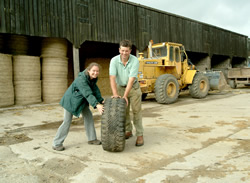
AN experimental scheme in the Peak District could hold the key to the safe disposal of the UK's farming "tyre mountain".
Once used extensively on silage clamps, millions of old tyres have been abandoned in corners of fields and farmyards after being made redundant by the widespread switch to baling silage.
Pressure is now mounting on the agricultural sector to find environmentally safe ways of disposing of the piles of tyres.
Government legislation came into force earlier this month, banning the disposal of whole tyres at landfill sites. And from 2006 shredded tyres will also be barred.
But a pioneering group of four farms in the Peak District - led by the National Park Authority (NPA) and backed by the Countryside Agency through its Eat the View initiative - could hold the answer for farmers nationwide.
They have joined forces to recycle hundreds of tyres as carpet underlay and even fuel.
The Peak District Waste Tyre Demonstration Project is an experimental offshoot of the first Peak District Environmental Quality Mark awards, announced earlier this month.
Funded by the Countryside Agency and managed by the NPA, they aim to develop markets for "environmentally sustainable" farm products and other goods and services that protect and enhance the local landscape.
The new marketing scheme makes it easier for shoppers to identify food and drink, arts, crafts and accommodation services that have strong links with high quality management of the landscape and environment.
Farmers seeking the mark are obliged to meet high standards of environmental care on their farms. Part of this is caring for the appearance of their properties.
The farmers' waste tyre collection was masterminded by Peak District Environmental Quality Mark Officer Victoria Coates, who encouraged the farms to combine forces.
She explained: "Every farmer in the country who has tyres on their farm will probably have to think about what to do with them very soon.
"A third of applicants for the Environment Quality Mark had tyres they no longer used and wanted to dispose of and this reflects a larger waste problem throughout the Peak District National Park.
"This project was set up to gauge the feasibility of disposing of tyres from farms through a deliberately selected environmentally responsible route.
"Waste Tyre Solutions, which specialises in the collection, disposal and recycling of 12 million tyres each year is undertaking the work.
"The majority of tyres are likely to be recycled into carpet underlay. Those tyres that are good enough will be sent to Sapphire Energy Recovery Limited where they will be converted to shredded rubber as an alternative fuel for LaFarge Cement of Cauldon, near Leek."
She added: "Lessons learned from this demonstration project can be shared with the wider farming community."
One of those taking part in the scheme is sheep and beef farmer Chris Elliott who runs 250-acre Shepherds Flatt Farm at Eyam with wife Glennie.
He said: "We gave up the milking side of the business and decided last year to diversify by opening a small caravan site. Most of our meat is sold through Bakewell market and local butchers but we have had a number of enquiries about the source of the food from tourists.
"To qualify for the Environment Quality Mark we had to undertake to dispose of around 400 tyres which until about four years ago, were used for the silage clamp.
"We realise we're not just a farm now and we have a duty to meet the public's expectations on environmental responsibility. We literally get masses of visitors here and it's only right that they see our work providing some environmental benefits."
Dave Parker of the Countryside Agency commented: "It can be expensive and difficult for individual farmers to dispose of perhaps a couple of hundred tyres at a time. We hope to show, through this demonstration project, that by joining together they can find a workable, cost effective option."
The other farms participating in the demonstration scheme are:
* Butterlands Farm, Wincle (Brian and Jane Clarkson)
* Common Barn Farm, Rainow (Geoff and Rona Cooper)
* Beechenhill Farm, Ilam (Terry and Sue Prince).
